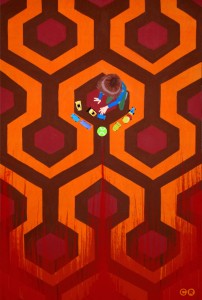
By the end of the 1970s Stanley Kubrick had established himself as a brilliant director, having released acclaimed films like Lolita, Dr. Strangelove, 2001: A Space Odyssey, A Clockwork Orange, and Barry Lyndon. But when The Shining came out in 1980 reviews gave the impression that Kubrick’s love affair with critics had ended. Even Stephen King said he hated it and that it failed as an adaptation of his novel. It failed to earn a nomination for a single Academy Award or Golden Globe, but did land a few Razzie nominations. Since then viewers and critics alike have grown to love The Shining. Roger Ebert, for example, pulled a 180 on his original opinion of the film and ended up slapping it on his list of “Great Movies”. Today, most seem to consider The Shining just as much of a classic as anything else Kubrick made during his celebrated career. Some obsessives, though, think of it as more than just a great horror flick and insist that the film hides secret messages and meanings. But, does it really?
Room 237 is a “subjective documentary”. It basically consists of just over one hundred minutes of clips from Kubrick’s The Shining with various narrators doing their best to convince the watcher that their understanding of the movie is the correct one. I have always enjoyed film analysis. To me, staying up until the early hours of the morning reading pages and pages of reviews dissecting movies to ridiculous degrees sounds like quite an enjoyable evening. In fact, I have spent more than one evening doing that very thing for The Shining. Needless to say, I thought I was exactly the kind of niche audience Room 237 aimed for, so I watched it the first chance I had.
Unfortunately the majority of the film feels more like a sit down with a group of conspiracy theorists as opposed to a serious work of film analysis. One narrator, for example, talks at length about how the film parallels the myth of the Minotaur. Her theory seems based entirely on a poster of a skier in the background of a scene that kind-of-sort-of-but-not-really looks like a Minotaur. Another narrator, perhaps the looniest of the bunch, attempts to convince the viewer that The Shining proves that Stanley Kubrick helped fake the moon landing footage. The only analysis of the bunch that I think holds any water whatsoever asserts that the movie has an underlying theme that deals with the slaughter of the Native Americans by European immigrants. Plenty of imagery throughout the film supports this notion, and the dialogue makes pretty direct references to it a few times. The owner mentions that the hotel stands on an Indian burial ground, and the ghost butler talks about the “white man’s burden” to Jack Torrance previous to Torrance going on a rampage and attempting to kill his family. But even the man presenting this interpretation goes off the deep end by spending way too much time talking about cans of baking powder and promotional tag lines used on movie posters in Europe. What is it with these people and posters, anyway?
To director Rodney Ascher’s credit, he does not endorse any of the interpretations presented in Room 237. Based on an interview he did for Complex magazine, he seems to think that the subjects of his film reach way past that which Kubrick originally intended. If you take into account that the subjects of the movie are closer to being obsessive lunatics than serious film critics, Room 237 changes dramatically and becomes much more intriguing and charming. Shortly into the film I stopped wondering whether Kubrick really meant to plant any of the ideas presented by the narrators and instead started thinking about the narrators themselves. Do these people constantly talk about their Shining-based conspiracy theories to their friends? Do they have any friends? What do they do for a living? Do they seem normal most of the time, or do they come across as just as strange at work as they do in Room 237?
Even though I think just about everything presented in Room 237 is rubbish, I enjoyed watching it. At first I found myself disappointed in the lack of quality analysis, but I ended up having a good time listening to the crazy conspiracy theories. If you want to delve into some quality critical dissections of Stanley Kubrick’s The Shining, you should probably skip this movie. But if you find yourself in the mood to put yourself in the head of a handful of crazy people all obsessing over their strange takes on a horror movie that came out in 1980, Room 237 is the perfect movie for you! I don’t foresee many films on the horizon that will fill that niche better than this one does, so you should probably go ahead and watch this one.
Room 237 is available to rent or purchase from a number of different places, including Amazon Instant Video and Google Play Videos.
© 2013, The Indie Mine. All rights reserved.




